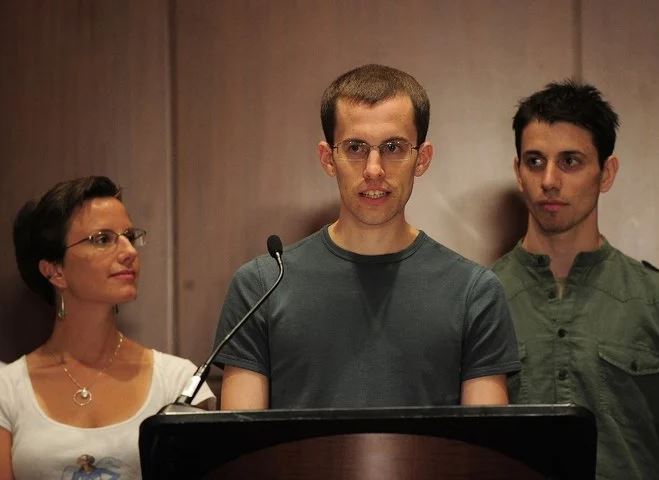Three Americans who were detained by the Iranian government for over a year are suing their former captors, arguing that they are owed damages by the Tehran regime for the suffering and torture they endured while being imprisoned on baseless charges of espionage.
The trio — Sarah Shourd, Shane Bauer and Josh Fattal — were hiking on the Iranian border with Iraq in 2009 when they were seized.
Shourd and Bauer, who are both journalists and were formerly married, and Fattal are having their lawsuit overseen by federal judge Richard Leon in Washington.
In 2019, Leon ordered the Tehran regime to pay Washington Post journalist Jason Rezaian $180 million after he endured a similar experience to the trio and was imprisoned for over a year on false espionage charges.
Leon heard the case in Iran’s absence after the Iranian government failed to respond to the suit filed in October 2016.
Rezaian was awarded the hefty damages in order to influence the regime and dissuade it from using hostages as political bargaining chips.
The US has seized significant Iranian assets following a sanctions plan brought in to tackle the Tehran regime’s terror activities around the world, with any damages awarded to the trio expected to come from the congressional Justice for Victims of State Sponsored Terrorism Fund.
Shourd and Bauer were originally opponents of US sanctions against Iran after their captivity ended, but now stand to benefit from the curbs if their lawsuit is successful.
Bauer in 2016 said the sanctions were “totally irresponsible,” while Shourd said the restrictions will hit “the poorest Iranians the hardest.”
The Guardian newspaper requested comment from attorneys representing all three of the former prisoners, but did not receive a response.
The lawsuit filed by the trio details the story leading up to their captivity, with Shourd and Bauer moving to Yemen and then Syria in 2008.
Shourd, an antiwar activist, and Bauer, a freelance journalist, moved there to improve their Arabic.
Fattal visited the couple in 2009, when the group embarked on the ill-fated hike to Iraqi Kurdistan that would spark the controversy.
A group of Iranian soldiers stopped the group after they reportedly accidentally crossed into Iran, with the soldiers mistaking the trio for Iraqis and rummaging through their items, including cameras and hiking gear.
The three were bundled into a car, where they remained for three days, fearing for their lives. The lawsuit added that they were taken to Tehran’s infamous Evin prison, where several high-profile Western hostages have been held captive, and kept in small separate cells.
The legal action launched by the trio argues that they were questioned in a way that attempted to make them reveal that they were US spies.
Bauer was asked if he worked for an American mercenary firm, while Shourd was challenged on whether she was working on a US government mission, and questioned about any visits to the Pentagon.
The lawsuit also claims that a guard once told Bauer that he knew the American was not a spy, adding: “But it was up to the US government and the Iranian government to negotiate his release,” suggesting that the Tehran regime was using the three hostages as political bargaining chips — a strategy deployed by Iran in recent decades.
All three of the former prisoners said that they frequently heard screams of torture from nearby cells, and feared that they would be next to face the brutal treatment.
Shourd was kept by herself throughout the ordeal, with the lawsuit alleging that Iranian officials and guards failed to treat a breast lump, precancerous cervical cells and other health problems that she reported.
Bauer and Fattal were eventually kept together in a cramped cell.
Shroud was released in September 2010, with the regime branding it an act of clemency post-Ramadan, but Bauer and Fattal were denied release for another year.
Mahmoud Ahmadinejad, Iran’s president at the time, reportedly released the pair before flying to the UN General Assembly in New York in order to gain plaudits.
The trio attracted significant media attention on their return, with former President Barack Obama issuing a statement celebrating their release.
All three reported struggles with the symptoms of post-traumatic stress disorder in the US. Their personal lives suffered. Shourd and Bauer married in 2012, but divorced seven years later.
This is not the first lawsuit brought on by the group, with Shourd and her mother suing the Iranian government in May.
Families endured significant emotional turbulence during the trio’s captivity, with the joint lawsuit arguing that Shourd was a political hostage.
Fattal and his family also launched a lawsuit in July. Bauer’s family completed the set in August.

